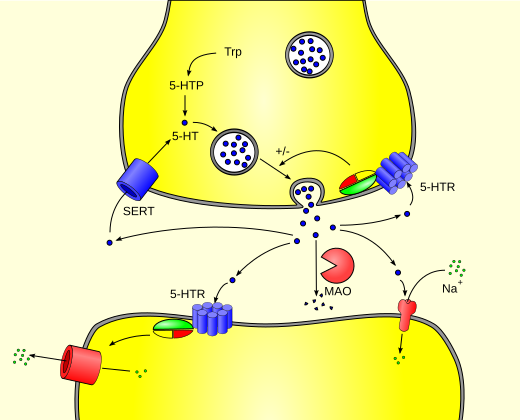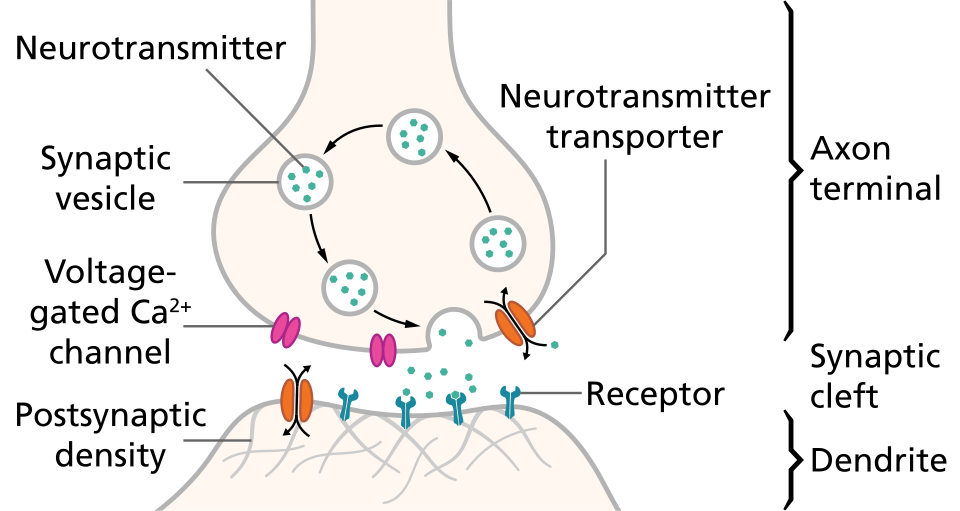IB Syllabus focus:
'- Functions in the body and brain
- Impact on mood disorders
- Treatment implications'
Serotonin is a critical neurotransmitter that is essential in modulating various bodily and psychological functions. It is widely recognised for its roles in regulating mood, emotion, and a multitude of other behavioural processes. Understanding serotonin's pathways, such as those illustrated in synaptic transmission, is crucial for grasping how neurotransmitters like serotonin and dopamine interact within the brain.
Functions in the Body and Brain
In the Brain
Mood Regulation: Serotonin is renowned for its significant role in managing mood and emotional states. Its interplay with other neurotransmitters like oxytocin further enriches our understanding of emotional regulation and attachment behaviours.

Raphe nuclei in the brainstem (green) are the principal sources of serotonergic projections throughout the brain, helping regulate mood, arousal, sleep, and autonomic functions. This schematic locates dorsal, median/central, and other raphe groups across midbrain, pons, and medulla. Source.
Sleep Cycle Management: It is pivotal in regulating the sleep-wake cycle and impacts overall sleep behaviours.
Appetite Control: It plays a crucial role in appetite regulation and can influence feelings of satiation.
In the Body
Digestive System Regulation: The majority of serotonin is found in the gastrointestinal tract, where it regulates intestinal movements.
Cardiovascular Function: Serotonin helps in the regulation of blood clotting by causing blood vessels to narrow.
Bone Metabolism: High levels of serotonin in bones can hinder bone density, highlighting its importance in bone metabolism. This interconnects with studies on twin studies that explore genetic versus environmental influences on physiological traits.
Impact on Mood Disorders
Depression
Deficiency in Serotonin: A deficiency in serotonin levels is often associated with mood disorders such as depression.
Symptoms: Individuals may experience persistent feelings of sadness, a lack of interest in activities previously enjoyed, and feelings of worthlessness.
Anxiety
Serotonin Imbalance: It has been suggested that an imbalance in serotonin levels can contribute to anxiety disorders.
Effects: Symptoms may include persistent and excessive worry, restlessness, and muscle tension.
Obsessive-Compulsive Disorder (OCD) and Post-Traumatic Stress Disorder (PTSD)
Link to Serotonin: These conditions have also been linked to abnormalities in serotonin levels.
Manifestations: Individuals might experience unwanted recurring thoughts and compulsive behaviours in OCD, and intense distress and arousal to traumatic memories in PTSD.
Treatment Implications
Selective Serotonin Reuptake Inhibitors (SSRIs)
Function: SSRIs are a class of drugs that inhibit the reuptake of serotonin, allowing more serotonin to be available in the synaptic gap.

Labeled serotonergic synapse highlighting the serotonin transporter (SERT) that SSRIs inhibit, postsynaptic 5-HT receptors, and monoamine oxidase (MAO). By blocking SERT, SSRIs increase serotonin in the synaptic cleft and enhance signaling at 5-HT receptors. Source.
Usage: They are commonly prescribed for mood disorders such as depression and anxiety.
Example: Fluoxetine is a well-known SSRI used to increase serotonin levels in the brain to alleviate symptoms of depression and anxiety.
Serotonin and Noradrenaline Reuptake Inhibitors (SNRIs)
Dual Action: SNRIs inhibit the reuptake of both serotonin and noradrenaline, providing a dual action.

A simplified synapse showing neurotransmitter release, postsynaptic receptors, and reuptake transporters—useful for illustrating that SNRIs block both serotonin and noradrenaline reuptake. This is a general synapse schematic (not specific to 5-HT) and includes extra elements such as Ca²⁺ channels that exceed syllabus requirements. Source.
Applications: They are often used when SSRIs are ineffective, and they are indicated for major depressive disorder, anxiety disorders, and some chronic pain conditions.
Effects: They can improve mood, reduce anxiety, and alleviate pain perceptions.
Cognitive Behavioural Therapy (CBT)
Approach: CBT is a psychological approach that addresses negative thought patterns and behaviours.
Relation to Serotonin: It can be used in conjunction with pharmacological treatments to address underlying cognitive aspects of mood disorders, thereby potentially affecting serotonin regulation.
Benefits: It has been found effective in treating conditions like depression and anxiety by altering maladaptive thoughts and behaviours, which could, in turn, influence serotonin levels positively.
Lifestyle and Dietary Changes
Exercise: Regular physical activity has been shown to increase brain serotonin levels and is recommended as part of the management for mood disorders.
Diet: Consuming a diet rich in omega-3 fatty acids, vitamins B6 and B12, and tryptophan can potentially influence serotonin production.
Mindfulness and Relaxation Techniques: These can also contribute to managing stress levels, potentially impacting serotonin levels and overall well-being.
Future Treatment Possibilities
Personalised Medicine: Future research is looking at personalised medicine approaches, understanding individual differences in serotonin production and regulation.
Advanced SSRIs and SNRIs: Development of more advanced and specific SSRIs and SNRIs that can target specific serotonin receptors is a possible direction.
Neuromodulation Techniques: Exploring non-invasive neuromodulation techniques like transcranial magnetic stimulation (TMS) can offer alternative approaches to modulating serotonin levels in the brain.
Ethical Considerations in Treatment
Informed Consent: It is essential for individuals to be fully informed about the potential benefits, side effects, and risks associated with serotonin-related treatments.
Autonomy: Respecting the autonomy of individuals in making treatment decisions is paramount.
Access to Treatment: Equitable access to treatment options is crucial to address disparities in healthcare availability and delivery.
SSRIs and Adolescents
Increased Risk: There is an increased risk of suicidal thoughts and behaviours in adolescents using SSRIs.
Monitoring: Close monitoring and a comprehensive assessment of risk vs benefit are essential in this population.
Regulation and Guidance: Rigorous regulation and clear guidance are critical in managing the risks associated with SSRI use in younger populations. Ethical considerations, as discussed in ethical considerations in animal studies, also provide insight into the broader ethical framework within psychological research.
Final Remarks
Understanding serotonin's multifaceted roles in body and brain functions elucidates its impact on various mood disorders. The interconnection of serotonin with other areas of study, including the structure and function of the brain explored in brain regions and functions, enriches our understanding of its comprehensive role in our physiological and psychological well-being. The development of treatments targeting serotonin levels and their effectiveness sheds light on the intricate interplay between neurotransmitters and human behaviour. Ethical considerations and future research directions pave the way for refining treatment strategies and enhancing the quality of life for individuals affected by serotonin-related conditions.
FAQ
Serotonin is pivotal in modulating the sleep-wake cycle. It is a precursor to melatonin, a hormone that regulates sleep. When there is a deficiency or imbalance in serotonin levels, it can lead to disruptions in the production of melatonin, affecting sleep quality, duration, and onset. People with low serotonin levels might experience difficulties in falling asleep and maintaining sleep, leading to insomnia. Conversely, elevated levels might lead to increased sleepiness. The relationship between serotonin and sleep is intricate, and maintaining balanced levels is essential for sustaining healthy sleep patterns and overall well-being.
Measuring serotonin levels can be challenging. Usually, blood tests measure serotonin levels in the blood, but this does not reflect the levels in the brain. However, these measurements can still provide insights and are particularly useful in identifying Serotonin Syndrome or serotonin-secreting tumours. In clinical practice, rather than directly measuring serotonin, healthcare providers often assess symptoms, medical history, and responses to treatments that impact serotonin levels to make a diagnosis. This indirect approach helps in personalising treatment plans for mood disorders and other conditions related to serotonin imbalance.
Yes, an excess of serotonin can lead to a condition known as Serotonin Syndrome, which is typically caused by the use of certain drugs. It is a serious condition that can occur when medications or supplements increase serotonin to a harmful level. Symptoms can range from mild, like shivering and diarrhoea, to severe symptoms like muscle rigidity, fever, and seizures. It's crucial to manage and monitor the intake of substances that can affect serotonin levels, especially when combining different medications, to avoid this potentially life-threatening condition. Immediate medical attention is necessary if Serotonin Syndrome is suspected.
Yes, several natural methods can maintain or boost serotonin levels. Regular exercise is known to increase serotonin production and release. Exposure to sunlight and light therapy can elevate mood by raising serotonin levels. A balanced diet rich in vitamins B6 and B12, omega-3 fatty acids, and foods containing tryptophan (such as turkey and eggs) can also support serotonin production. Additionally, managing stress through mindfulness and relaxation techniques can positively impact serotonin levels. Maintaining a healthy lifestyle, balanced diet, regular physical activity, and stress management are essential components in naturally sustaining serotonin levels.
Serotonin is integral to appetite regulation. It's produced in the gastrointestinal tract and helps in signalling to the brain when it's time to stop eating, contributing to feelings of satiation. When serotonin levels are low, it can lead to increased appetite, potentially contributing to weight gain. Furthermore, it influences cravings, and an imbalance in serotonin levels can lead to cravings for carbohydrates, particularly sugars. Understanding the relationship between serotonin and appetite is crucial as it impacts eating behaviours, which in turn, can have significant implications on overall physical health and well-being.
Practice Questions
Serotonin plays a crucial role in mood regulation and is integral to maintaining emotional balance. Mood disorders like depression are often linked to lower serotonin levels, leading to feelings of sadness, loss of interest, and worthlessness. Anxiety disorders are associated with imbalances in serotonin, causing excessive worry and restlessness. The treatment implications for mood disorders often involve regulating serotonin levels using medications like SSRIs or SNRIs and psychological therapies like CBT, focusing on altering negative thought patterns and behaviours, thus potentially influencing serotonin levels and improving overall well-being.
Ethical considerations are paramount when addressing serotonin-related treatments for mood disorders. Informed consent is fundamental, ensuring individuals are aware of the potential risks, benefits, and side effects. The autonomy of patients in making decisions about their treatment must be respected. Equitable access to treatment is essential to address healthcare disparities. Special attention and rigorous regulation are needed when SSRIs are prescribed to adolescents due to the increased risk of suicidal thoughts and behaviours, necessitating thorough risk-benefit assessments and close monitoring to manage associated risks and safeguard the well-being of younger populations.

